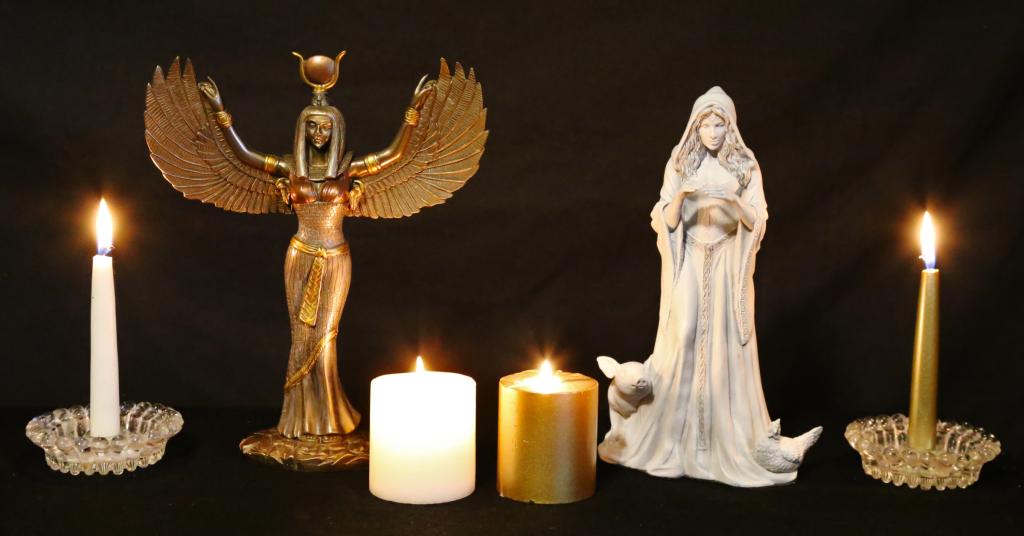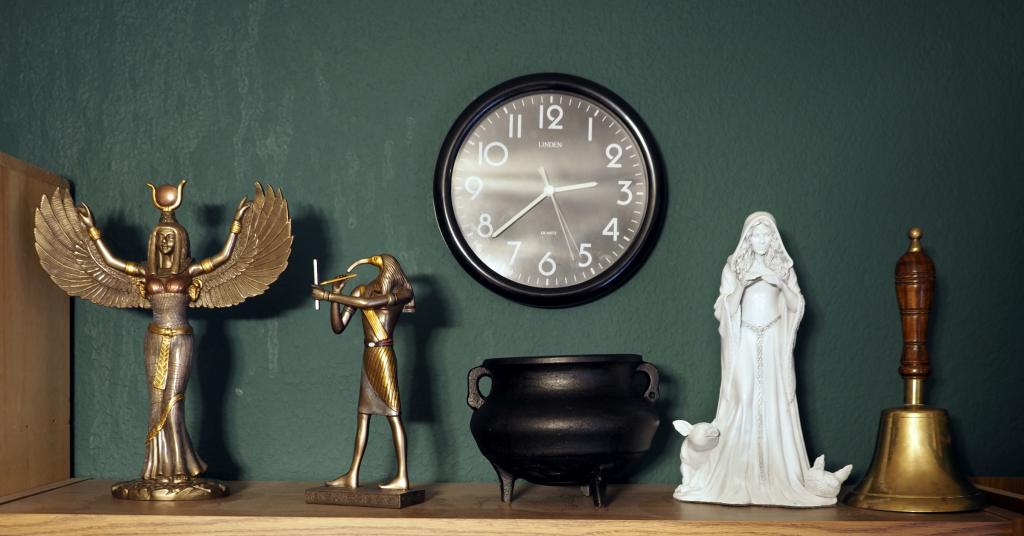Here’s a question I hear on a fairly regular basis: “how can I worship and/or work with deities from different pantheons?” Is that even possible? Is it disrespectful? Is it dangerous?
Like so much else with the Pagan and polytheist religions we’re building and rebuilding, there are no hard rules or clear answers. There are only virtues and values, and the experiences of those of us who are doing this work.
Yes, you can worship and work with Gods from different pantheons, different cultures, and different parts of the world. It’s not as simple as filling your plate from different sections of the super buffet. It requires mindfulness and care, and a lot of work – sometimes double the work.
But it can be done.

The Gods call who They call
Let’s start here, with many Gods who are individual persons, each with their own sovereignty and agency. They may have longstanding relationships with certain groups of people (or they had such relationships in the past) but They are free to call whoever They like into Their service today.
They’re Gods – how could They not be able to do that?
And the experience of many, many people says They do just that.
I’ve written about this several times over the years, mostly in response to a few people claiming that Gods only call people with the “right” bloodlines. Some of these people are well-meaning but misguided. Others are racists who want a religion that excludes people who don’t look like them.
You can gatekeep people away from the Gods, but you can’t gatekeep the Gods away from people. If They want to call them to Their service, They’ll walk through your gates like they aren’t even there. They’re Gods, remember?
Sometimes They call someone who already has a relationship with a deity from another pantheon. Why? I suspect it has something to do with the old saying “if you want something done, give it to a busy person.” Show you’re capable of doing what one God wants done and other Gods will take notice.
Or so I think – They aren’t big on explaining Themselves. What’s important is that this does happen. So the primary question isn’t “is this possible?” but rather “how can we do it well?”
Give each what They want
At the risk of oversimplifying a complicated question, most times it comes down to this: give each God what They want.
That may mean setting up separate shrines and altars. It may mean worshipping one on one day and the other on another day. It will almost certainly mean two different sets of prayers and offerings.
Our Gods are not jealous Gods. But They want what They want.
Occasionally I see people thinking a deity is upset with them for paying attention to another deity. Sometimes this is a conceptual misunderstanding. The fact that a certain desert God is well-known for being jealous (or at least, His followers say He is) doesn’t mean all Gods are jealous. In my experience, few are – jealousy is not a virtue.
More often, when someone thinks a God is jealous what it really means is that they haven’t been giving Them what They asked for. If you make promises to one deity, you don’t get to ignore or slight those promises just because another deity makes additional demands.
In most cases, if you give each what They ask for you’ll be just fine.
Respect the boundaries of religions and cultures
That doesn’t mean you can mix and match any way you like. “They call who They call” refers to the autonomy of the Gods, not to the autonomy of individual humans.
Gods are persons. Religions are a set of protocols for interacting with persons, some of whom are divine. Access to one does not necessarily grant you access to the other.
I’m a member of ADF – Ár nDraíocht Féin. ADF is explicitly and intentionally an Indo-European organization. While members are free to worship and work with any deity from any part of the world, ADF rituals are restricted to deities associated with Indo-European cultures. Worshipping Isis in an ADF ritual is not permitted.
I have a relationship with Isis that predates my relationship with Cerridwen. Inside an ADF circle, that’s irrelevant. ADF has its own boundaries and it’s my obligation to respect them.
In my personal practice, I’m free to do what seems right to me. And while Isis and Cerridwen share a shelf-shrine in my office (along with Thoth), the only time I worship Them together is when I’m honoring all the Gods with whom I have a formal or semi-formal relationship.

The same is true for other religions and cultures, especially indigenous cultures. Worshipping a God doesn’t make you part of a human culture. If you want to be a part of a human culture, you have to do things their way – assuming they’ll take you.
Listen, listen, listen
This is true in any relationship: with your spouse and other family members, with friends and coreligionists, and with your Gods. If you don’t listen – and if you don’t listen a lot more than you talk – you’re going to have problems.
Listen in meditation. Listen through reading: history, lore, and contemporary devotion. Listen through divination. And if you can, listen in ecstatic devotion.
Regular spiritual practice is the foundation of any good religion, including our own Pagan and polytheist religions. Through such practice you will either fulfill your obligations to your deities, or you’ll come to understand what more They want.
Don’t overcommit
Listen, be respectful, and give all your Gods what They ask for. That’s pretty much the recipe for working with multiple deities, whether in the same or different pantheons. But take care to insure you don’t promise more than you can deliver.
My relationship with Isis and the other Gods of Egypt (some of Them, anyway) is complicated and somewhat unique. I make occasional offerings to Them, and I participate in our reimagining of an Egyptian Temple Ritual once a year. That’s quite doable for me. If I had to observe every holy day on the Egyptian liturgical calendar, I’d have no time left for Cernunnos, the Morrigan, and the other deities with whom I have formal relationships.
And that wouldn’t work out very well.
You don’t have to say yes (most of the time, anyway). I’ve turned down some Gods in part because what They wanted would strain my ability to fulfill the obligations I’ve already made to other Gods. One hasn’t given up, and I may yet end up committing to some limited form of worship and service. Maybe. That’s a matter for negotiation.
(I’m not likely to blog about this in any case – if you’re curious, buy me a beer or a cup of tea at Mystic South and I’ll tell you about it… probably more than you want to know.)
This is polytheism in our time
In ancient times, people grew up knowing their Gods: the Gods of their family, of their city, of their land. If they moved they might carry the worship of their Gods with them, or they might adopt the worship of the Gods of their new land. Or they might do both.
We live in a different era. Few of us are born into a relationship with a deity. Few deities have a multi-generation relationship with people. We are trying to build relationships and communities among and between Gods and humans. That’s not a neat and easily defined process.
The Gods call who They call. Sometimes Gods from different pantheons call the same person. That makes things more complicated.
But it also brings more opportunities.
Listen.
Be respectful.
Don’t overcommit.
And when you do commit, give each God what They ask for – do what you promised you’d do.
May your all your divine relationships be healthy and whole.


















